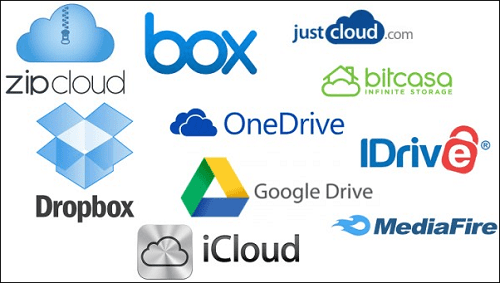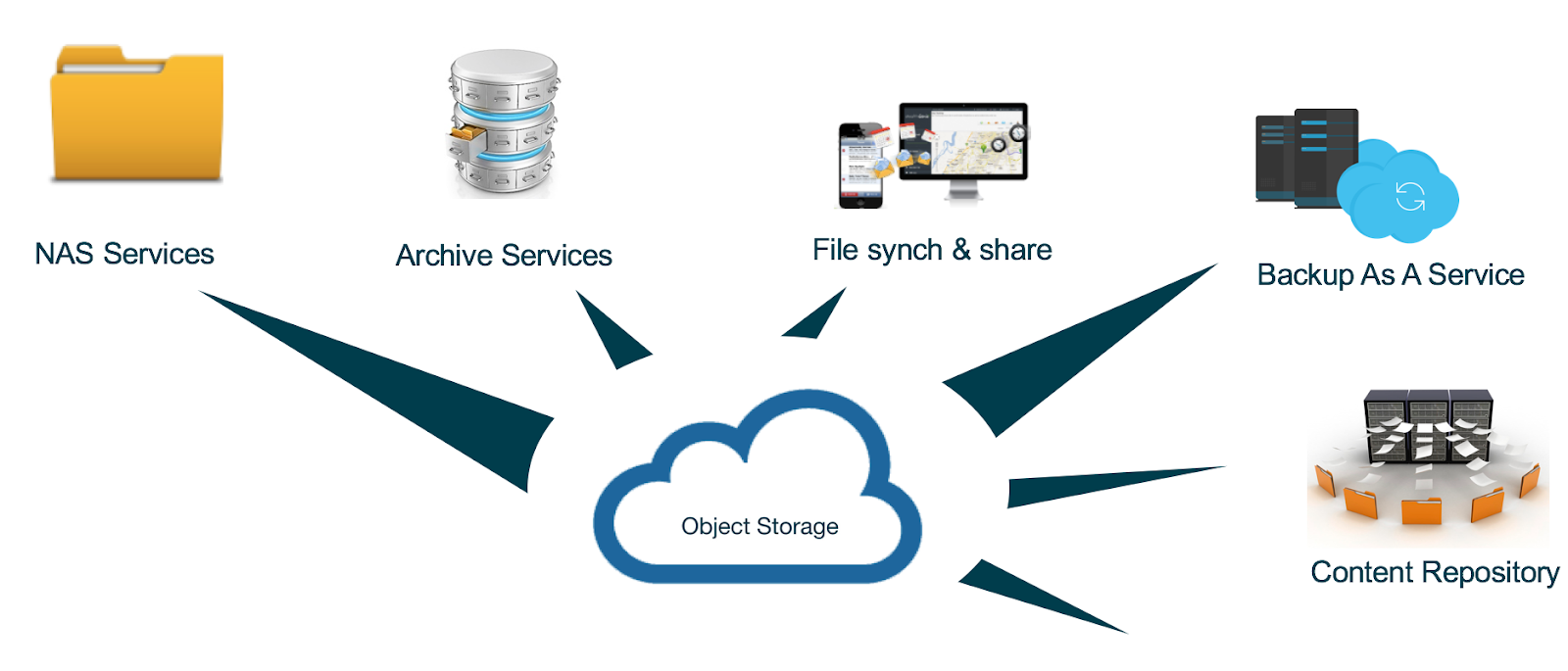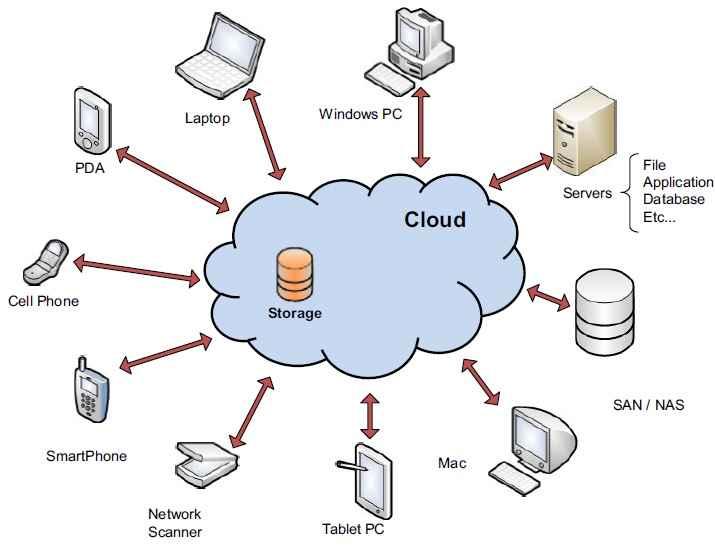Store data in the cloud
Hi, Habr! Today we will talk about the services of synchronization and file sharing and object cloud storage. Cloud storage, represented by services such as SkyDrive or Dropbox, is familiar to users of mobile devices and computers. In recent years, they appear in increasing numbers. These services allow users to easily, quickly and at any time get authorized access to files via the Internet.
According to Statista, in 2017, more than 1.8 billion people used personal cloud storage in the world. The obvious advantage of storing data in the cloud is device independence, access from anywhere and from any system. Cloud storage is a great way to protect yourself from emergencies. It allows you to access your data from another device if the main one was lost or stolen.

Traditional cloud storage, such as Google Drive, Amazon Cloud Drive, Dropbox, Microsoft One Drive, Krok Disk, are called synchronization and file sharing services. Usually they are used for personal use: files on the user device are synchronized with the cloud, they can be shared with others. With the Google Drive service, Mail.ru cloud or Yandex.Disk, there is no need to send files by mail - just send the link and open access. Many companies, such as Microsoft and Dropbox, offer free plans for general use, as well as flexible and customizable reward plans for Business and Pro.
')

Here are the services most known to Russian users:

Most of these cloud services have additional functions - file browsing tools, built-in document editors, screenshot tools, etc. Along with the storage capacity provided for free or for a fee, these are their main differences. What unites these services is that many of them store files in known powerful and scalable object storages.
Another category of services is object storage, for example, Amazon S3 , Google Cloud Storage, Microsoft Blobs Storage. These highly reliable storages are designed to store a large number of files and hundreds of petabytes of data. It is their use of many services synchronization and file sharing. Both types of services are in growing demand.
Files in the object storage are accompanied by meta-data that allows you to process these files as objects: documents, videos, projects, photos, etc. This is a popular service used in a variety of applications. A software interface (API) is used to interact with cloud object storage.
In Russia, there are not so many object storage services. These are Google Cloud Storage, Amazon S3, MS Blobs Storage, Kroc file storage (serving Krok Disk service), Selectel, Rostelecom services, Mail.ru object storage, etc.
It is estimated that in the world, object stores now hold up to half of Internet content. And up to 50% of synchronization and file sharing services store data in Amazon S3 — unlimited capacity object storage with a simple web interface. The basic access protocol is S3 API, created by Amazon Web Services for AWS S3 (Simple Storage Service).
Public cloud storage services today attract not only small and medium-sized businesses, but also large companies. Of course, there are special requirements for such repositories. The key factors of enterprise-class cloud storage are not only the cost of the service, but also its reliability, security, manageability and ease of administration, speed of access to data in the cloud.

Such storage involves placing data on distributed servers. Data is backed up, stored on multiple servers in secure data centers with a high level of reliability and on multiple sites. High reliability is achieved, for example, by automatically creating multiple replicas of data on separate independent servers. Tier III reliability means that the SLA guarantees availability 99.98% of the time.
Thus, cloud storage for business allows you to store data fairly reliably and inexpensively, provide access to them regardless of location, and easily scale resources. Costs of creation and maintenance of IT infrastructure are reduced, the service helps to increase the flexibility of business processes.
There is no need to purchase their own storage and other infrastructure equipment, to bear the costs of its administration, updating, security. Constant access to the cloud storage means that you can work with data and files at any time and from any place. Employees can more quickly and easily obtain the necessary information, exchange data during joint activities, work with common documents. Encryption is provided for transferring and storing data, setting access rights, registering file operations, monitoring, and protecting against threats.
Currently, cloud storage services are offered by the largest Russian hosting providers, system integrators and telecom operators. Outwardly, they differ little from each other: a user-configurable folder and file structure, the ability to configure access, a similar interface. However, their internal architecture and the possibilities offered are different.
Similar services are charged according to the principle of actual use or available storage capacity. As a rule, downloading data from Russian services costs several times more profitable than offers from foreign suppliers. In addition, they have a lower latency when accessing data that is closer to the client. Another advantage of domestic cloud storage services is compliance with data storage requirements in Russia. In accordance with 152- “About personal data”, some data should be stored in the territory of the Russian Federation.
There are a variety of scenarios for the use of this cloud storage. For example, archiving, file storage and collaboration with them. Tasks can be very different: the main storage for cloud applications, big data storage, data repository for analytics and, of course, they are convenient to use for backup and disaster recovery.

Object storage can be used, for example, in the following scenarios: storing backup copies, placing web site content and letters (photos, videos, files for downloading), storing video surveillance records, archives, storing and distributing media content (video, music), as well as storage for workflow systems, game content, big data and IoT data. A wide range of devices is supported for accessing the storage and downloading data.
A popular service today is backup to the cloud. Most backup systems can be connected to our cloud storage via the S3 API. Supported and work with built-in backup applications.
Another common task is hosting static website content. In principle, such storage can be used for any data that is usually stored once and may be needed in the future, be it legal documents, medical records, digital assets and media files, various documents. For example, broadcasting and media companies need large repositories for media materials.
Data storage is only part of Amazon Web Services (AWS), which also includes management, development, security, and more. AWS is focused on the corporate sector, but Amazon Glacier's cloud-based file storage provides users with 10 GB of data for free.
AWS is characterized by increased reliability, compliance with enhanced data protection standards,
unlimited capacity (expansion for surcharge), ease of use and flexibility of settings, integration with other services of Amazon Web Services. There are domestic counterparts.
“Russian” object storages are usually created based on Ceph or Swift solutions with connectors for the S3 API. Not all of them provide full support for the S3 API. For users, this may mean an application compatibility issue that is written with a full set of S3 commands, or limited functionality. S3 API is supported by a large number of applications, in particular, by almost all backup systems and content management systems (CMS).

There are 100% compatible with S3 services. For example, Technoserv Cloud's object cloud storage is built using S3 technologies and supports a full range of S3 API commands, including advanced: access rights management, authentication, version control, multi-threaded loading, etc. On the Technoserv servers, there is a software-defined object storage Cloudian software. There is no single point of failure in SDS, all components are reserved. The claimed level of reliability of the physical platform is 99.999999%. To access the cloud storage, the Internet or a secure VPN channel is used, connecting the provider’s cloud to the client’s office or data center.

Examples of Russian cloud storage for business
Cloud storage typically includes the ability to set up a corporate data retention policy, as well as version storage, which can be used to save, retrieve, and restore previous versions of objects. The management portal allows the administrator to create user accounts and assign rights, manage user quotas, view statistics.
The benefits of cloud storage for businesses
Analysts predict that by 2020, the cloud storage market will grow to $ 3.5 billion, with an annual growth of 31%. Users and companies choose online storage because it is convenient, convenient, safe and economical. They store their files in clouds such as Amazon S3, Google Cloud Storage and Dropbox - depending on their needs. Although Amazon leads the way in popularity, Azure and Dropbox are ahead of the growth rate.
Cloud storage is becoming less expensive as storage equipment prices fall, combined with economies of scale on the platform. Over 75% of commercial companies use public cloud services to transfer and store important commercial information (according to a Symantec study). At the same time, 40% of them were faced with the disclosure of company data containing confidential information. Another 40% reported loss of data stored in the cloud, and were forced to restore them from backups.
Meanwhile, according to the DN Capital report, only in the last two years 90% of the world data was generated. With the growth of mobile and user-generated content, the development of broadband access (including 4G / 5G), there is no reason to expect that these rates will slow down. So, cloud storage has a great future.
According to Statista, in 2017, more than 1.8 billion people used personal cloud storage in the world. The obvious advantage of storing data in the cloud is device independence, access from anywhere and from any system. Cloud storage is a great way to protect yourself from emergencies. It allows you to access your data from another device if the main one was lost or stolen.

Synchronization and file sharing services
Traditional cloud storage, such as Google Drive, Amazon Cloud Drive, Dropbox, Microsoft One Drive, Krok Disk, are called synchronization and file sharing services. Usually they are used for personal use: files on the user device are synchronized with the cloud, they can be shared with others. With the Google Drive service, Mail.ru cloud or Yandex.Disk, there is no need to send files by mail - just send the link and open access. Many companies, such as Microsoft and Dropbox, offer free plans for general use, as well as flexible and customizable reward plans for Business and Pro.
')

Here are the services most known to Russian users:
| Service | Description |
| Yandex.Disk | Free service for storing files and folders with protection and the ability to expand cloud space. Yandex.Disk, like Google Drive, is integrated with other services, in particular, with Yandex mail, and has a number of useful additions. |
| Mail.Ru cloud | Cloud storage of files with access to a virtual disk and the functions necessary for such a service. It occupies one of the leading places in the ranking of file storage in Russia. On a set of features, it is comparable to Google Drive and Yandex.Disk. There are applications for creating and editing documents, a utility for taking screenshots. The service is integrated with other Mail.ru projects. Advantages - high speed of loading and uploading data for Russian users, there are clients for almost all platforms, including mobile operating systems, support for selective synchronization of folders and files in a folder. |
| Onedrive | Microsoft service for storing and synchronizing files between devices when connected to the Internet. Can expand capacity. In OneDrive, it's convenient to share Microsoft Office 365 documents and edit them through the Office Online service. Features of the service can be considered integration with Hotmail and Bing search engine. |
| Google Drive | Cloud storage with the option of multi-user access to files and their joint editing. The service is integrated with the Google Docs office suite, where you can edit documents from one account or several accounts simultaneously. The built-in client for Windows has standard settings, you can select individual folders or a hard disk for synchronization, limit the download speed and change your account to use Google services. |
| Dropbox | Service to automatically synchronize files of any size. There are advanced settings for the PC application, including the synchronization of individual folders and setting the speed of downloading and uploading files, tools for organizing users to work with data in the cloud. The difference from most services is storing different versions of files without using space in the cloud, as well as using the DeltaSync method: not the whole object is transferred to the server, but only the changed part, which reduces traffic. |
| CROC Disk | Convenient and secure enterprise-class file sharing service. |
| Brandquad | Centralized system for creating, storing and distributing commercial content. |
| iSpring Cloud | View PowerPoint presentations online from any device. |
| Mega (Megasynk) | Cloud storage with a large amount of free disk space - 50 GB. Other features - end-to-end data encryption (the key is not stored on the server) and open source. The application on the PC supports tracking any folders, setting bandwidth, exceptions download files by type and size. |
| Samsung Cloud | Service for owners of Samsung smartphones and tablets. Designed to store backup data from mobile devices - multimedia content, OS files, etc. |
| Apple iCloud | A free service integrated with other Apple services. The service is designed to store backup copies of data from the iPhone, iPad and iPod, as well as custom media files, mail and documents (they are automatically synchronized with the contents of iCloud Drive). |
| Baidu Cloud | For Russia it is not adapted, but it provides users with a terabyte of free disk space. Requires installation of the mobile application Baidu Cloud on your phone or tablet. |
| Yunpan.360 | This service of the Chinese company Qihoo 360 Technology also offers 1 TB for new users and another 2.6 TB when installing a mobile client. For Russian users, the location of servers in China means low speed. Well implemented Russification client. There is a preservation of version histories, a password-protected area, a file sharing system, video and audio playback, software for different operating systems and mobile platforms. |
| 4shared | The service is designed to share files with a total volume of up to 15 GB with a free connection. There is an automation of downloading files from GoogleDrive, DropBox and Gmail, advanced file sharing functions and support for the WebDev protocol. |
| Mediafire | The free package offers 10 GB. There are versions for PC on different platforms and mobile applications. Integration with social networks (Facebook, Google+, Twitter) and mail allows you to open access to objects to other users. |
| Ozibox | Also gives 10 GB as a gift. There is a PC client with a minimum of settings and a web interface. |

Most of these cloud services have additional functions - file browsing tools, built-in document editors, screenshot tools, etc. Along with the storage capacity provided for free or for a fee, these are their main differences. What unites these services is that many of them store files in known powerful and scalable object storages.
Object Cloud Storage
Another category of services is object storage, for example, Amazon S3 , Google Cloud Storage, Microsoft Blobs Storage. These highly reliable storages are designed to store a large number of files and hundreds of petabytes of data. It is their use of many services synchronization and file sharing. Both types of services are in growing demand.
Files in the object storage are accompanied by meta-data that allows you to process these files as objects: documents, videos, projects, photos, etc. This is a popular service used in a variety of applications. A software interface (API) is used to interact with cloud object storage.
In Russia, there are not so many object storage services. These are Google Cloud Storage, Amazon S3, MS Blobs Storage, Kroc file storage (serving Krok Disk service), Selectel, Rostelecom services, Mail.ru object storage, etc.
It is estimated that in the world, object stores now hold up to half of Internet content. And up to 50% of synchronization and file sharing services store data in Amazon S3 — unlimited capacity object storage with a simple web interface. The basic access protocol is S3 API, created by Amazon Web Services for AWS S3 (Simple Storage Service).
Cloud Storage for Business
Public cloud storage services today attract not only small and medium-sized businesses, but also large companies. Of course, there are special requirements for such repositories. The key factors of enterprise-class cloud storage are not only the cost of the service, but also its reliability, security, manageability and ease of administration, speed of access to data in the cloud.

Such storage involves placing data on distributed servers. Data is backed up, stored on multiple servers in secure data centers with a high level of reliability and on multiple sites. High reliability is achieved, for example, by automatically creating multiple replicas of data on separate independent servers. Tier III reliability means that the SLA guarantees availability 99.98% of the time.
Thus, cloud storage for business allows you to store data fairly reliably and inexpensively, provide access to them regardless of location, and easily scale resources. Costs of creation and maintenance of IT infrastructure are reduced, the service helps to increase the flexibility of business processes.
There is no need to purchase their own storage and other infrastructure equipment, to bear the costs of its administration, updating, security. Constant access to the cloud storage means that you can work with data and files at any time and from any place. Employees can more quickly and easily obtain the necessary information, exchange data during joint activities, work with common documents. Encryption is provided for transferring and storing data, setting access rights, registering file operations, monitoring, and protecting against threats.
Currently, cloud storage services are offered by the largest Russian hosting providers, system integrators and telecom operators. Outwardly, they differ little from each other: a user-configurable folder and file structure, the ability to configure access, a similar interface. However, their internal architecture and the possibilities offered are different.
Similar services are charged according to the principle of actual use or available storage capacity. As a rule, downloading data from Russian services costs several times more profitable than offers from foreign suppliers. In addition, they have a lower latency when accessing data that is closer to the client. Another advantage of domestic cloud storage services is compliance with data storage requirements in Russia. In accordance with 152- “About personal data”, some data should be stored in the territory of the Russian Federation.
What is object cloud storage used for?
There are a variety of scenarios for the use of this cloud storage. For example, archiving, file storage and collaboration with them. Tasks can be very different: the main storage for cloud applications, big data storage, data repository for analytics and, of course, they are convenient to use for backup and disaster recovery.

Object storage can be used, for example, in the following scenarios: storing backup copies, placing web site content and letters (photos, videos, files for downloading), storing video surveillance records, archives, storing and distributing media content (video, music), as well as storage for workflow systems, game content, big data and IoT data. A wide range of devices is supported for accessing the storage and downloading data.
A popular service today is backup to the cloud. Most backup systems can be connected to our cloud storage via the S3 API. Supported and work with built-in backup applications.
Another common task is hosting static website content. In principle, such storage can be used for any data that is usually stored once and may be needed in the future, be it legal documents, medical records, digital assets and media files, various documents. For example, broadcasting and media companies need large repositories for media materials.
AWS and compatible Russian cloud storage for business
Data storage is only part of Amazon Web Services (AWS), which also includes management, development, security, and more. AWS is focused on the corporate sector, but Amazon Glacier's cloud-based file storage provides users with 10 GB of data for free.
AWS is characterized by increased reliability, compliance with enhanced data protection standards,
unlimited capacity (expansion for surcharge), ease of use and flexibility of settings, integration with other services of Amazon Web Services. There are domestic counterparts.
“Russian” object storages are usually created based on Ceph or Swift solutions with connectors for the S3 API. Not all of them provide full support for the S3 API. For users, this may mean an application compatibility issue that is written with a full set of S3 commands, or limited functionality. S3 API is supported by a large number of applications, in particular, by almost all backup systems and content management systems (CMS).

There are 100% compatible with S3 services. For example, Technoserv Cloud's object cloud storage is built using S3 technologies and supports a full range of S3 API commands, including advanced: access rights management, authentication, version control, multi-threaded loading, etc. On the Technoserv servers, there is a software-defined object storage Cloudian software. There is no single point of failure in SDS, all components are reserved. The claimed level of reliability of the physical platform is 99.999999%. To access the cloud storage, the Internet or a secure VPN channel is used, connecting the provider’s cloud to the client’s office or data center.

Examples of Russian cloud storage for business
| Provider | Service Name | Description |
| 1cloud | Cloud Object Storage | Cloud object storage for backup, archival data, distribution of static site content, web application data, video surveillance systems, exchange of corporate documents. You can use the S3 or the OpenStack Swift API to connect applications and integrate with information systems. |
| "Technoserv" | Technoserv Cloud | The service helps to reduce the cost of creating and maintaining infrastructure, increase the flexibility of business processes and provide round-the-clock access to data via the Internet, a dedicated communication channel. Cloud object storage is compatible with Amazon Web Services, fully supports the S3 API access protocol. |
| Mail.Ru Group | Mail.Ru Cloud Solutions | Developers used their own IT infrastructure management experience with millions of users to create cloud services without limiting the speed of downloading and uploading a file with a high level of security. Supports standard S3-compatible protocol, SSL data encryption. |
| cloud4y | MultiStore | MultiStore cloud storage allows you to create logical partitions in a single storage system in such a way that unauthorized users cannot access information in a secure virtual partition. It also allows you to transfer virtual partitions between storage systems and is positioned as an easily manageable and powerful tool for disaster recovery of the system. |
| Selectel | Cloud storage | Cloud storage for web applications, archives storage, backup and distribution of static content with payment for storage, API requests and downloading data from the storage. Regardless of the amount of data and peak load level, fast access to the content is maintained. The number and size of files are not limited. You can connect your own or third-party applications through the API OpenStack Swift. Offers management of users, domains, certificates through the API. There are a number of ready-made plugins and integrations with CMS, CRM and other services. More than 200,000 servers worldwide form a CDN to speed up sites and deliver content. |
Cloud storage typically includes the ability to set up a corporate data retention policy, as well as version storage, which can be used to save, retrieve, and restore previous versions of objects. The management portal allows the administrator to create user accounts and assign rights, manage user quotas, view statistics.
The benefits of cloud storage for businesses
| IT cost savings | Own storage systems require constant maintenance, which means that a company must have IT staff. Thanks to cloud storage, companies can save a lot of money on maintenance, as their servers and storage are controlled by third-party vendors. By outsourcing data warehouses, companies save on capital and operating costs. This money can be used for business development and expansion. |
| Business process flexibility | According to recent polls, 79% of respondents already partially work outside their office, and another 60% will switch to remote work if they get the opportunity. Cloud storage services provide this flexibility for employees. |
| Enhanced teamwork | Employees often have to work together on projects and communicate with colleagues around the world. Cloud tools facilitate collaboration and document management. They allow users to access the latest versions of any document. |
| Data protection | Data is stored in several places and remains available in case of accidents and failures. |
Is everything so "cloudless"?
Analysts predict that by 2020, the cloud storage market will grow to $ 3.5 billion, with an annual growth of 31%. Users and companies choose online storage because it is convenient, convenient, safe and economical. They store their files in clouds such as Amazon S3, Google Cloud Storage and Dropbox - depending on their needs. Although Amazon leads the way in popularity, Azure and Dropbox are ahead of the growth rate.
Cloud storage is becoming less expensive as storage equipment prices fall, combined with economies of scale on the platform. Over 75% of commercial companies use public cloud services to transfer and store important commercial information (according to a Symantec study). At the same time, 40% of them were faced with the disclosure of company data containing confidential information. Another 40% reported loss of data stored in the cloud, and were forced to restore them from backups.
Meanwhile, according to the DN Capital report, only in the last two years 90% of the world data was generated. With the growth of mobile and user-generated content, the development of broadband access (including 4G / 5G), there is no reason to expect that these rates will slow down. So, cloud storage has a great future.
Source: https://habr.com/ru/post/353168/
All Articles